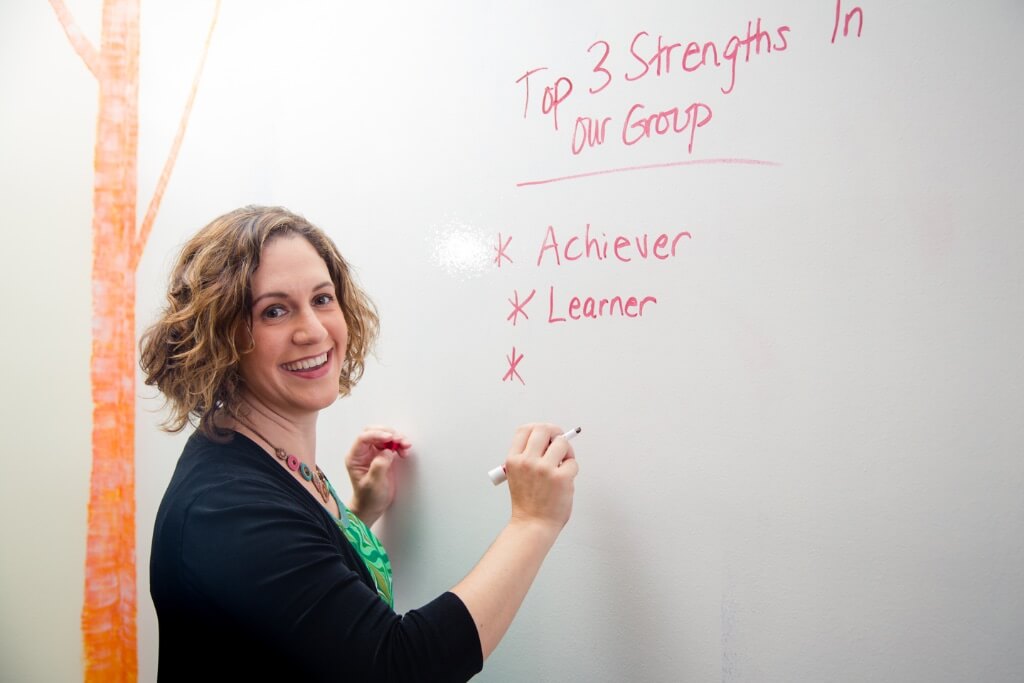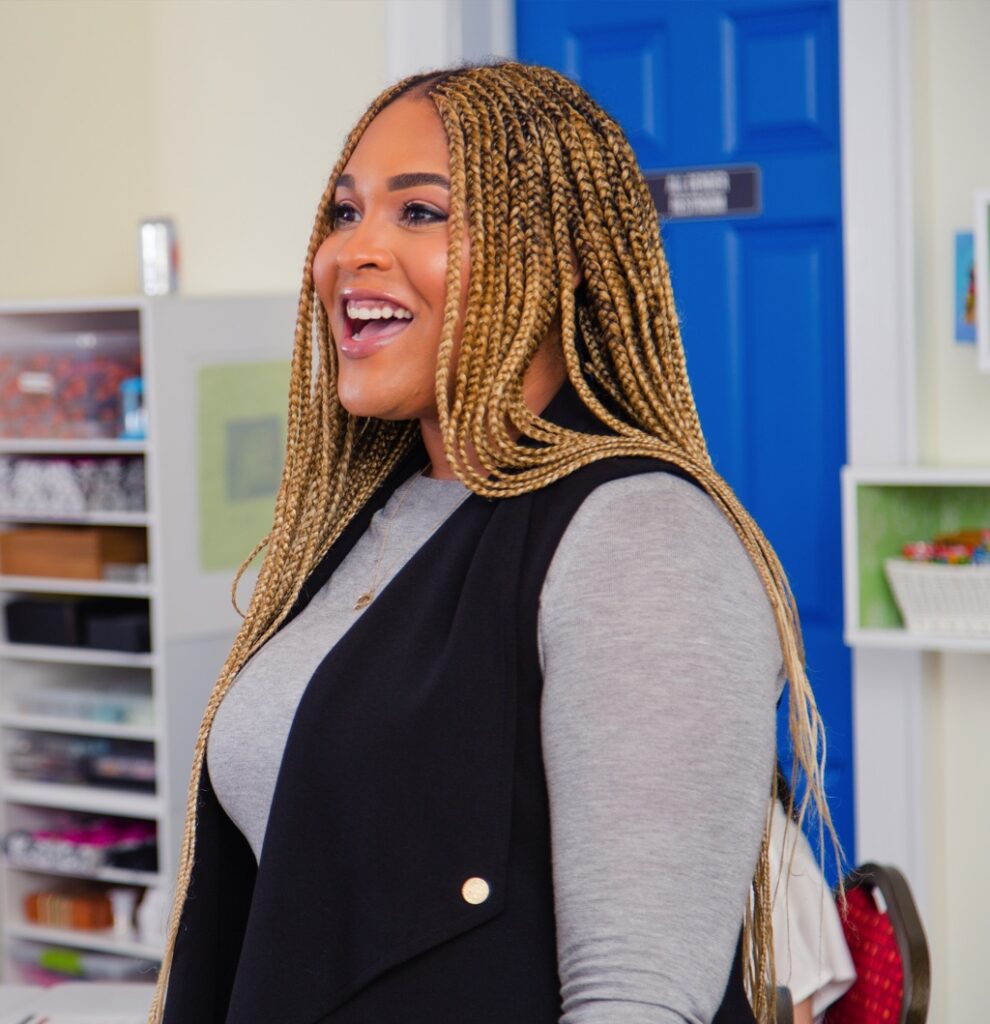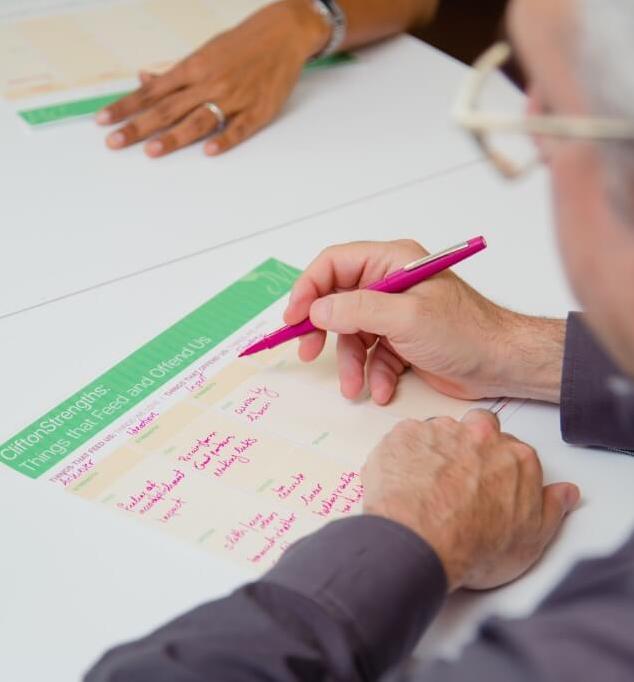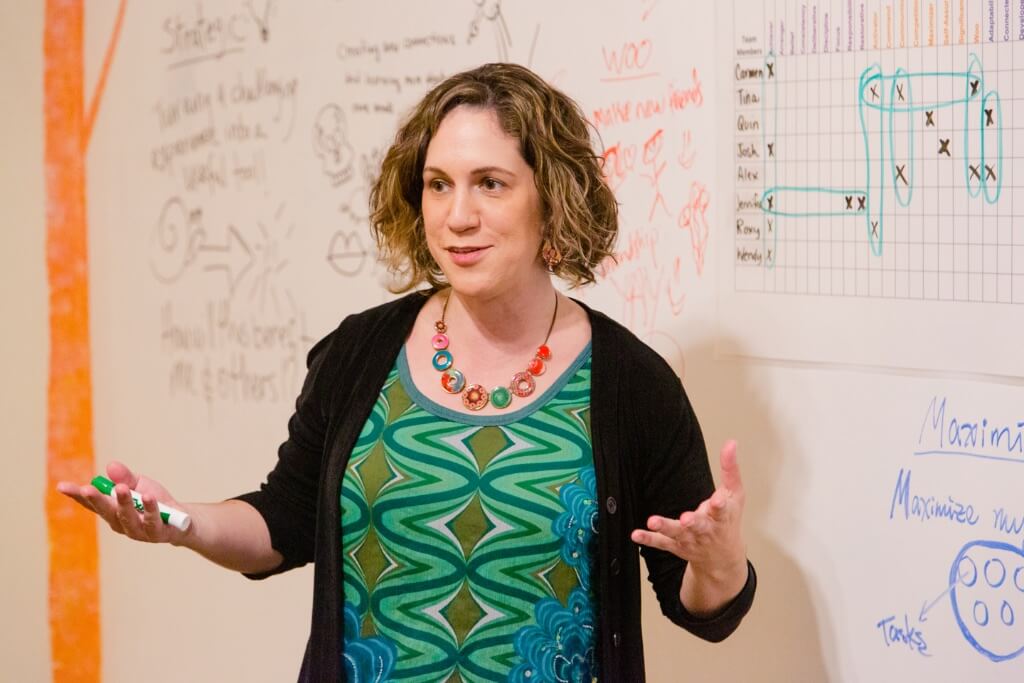
Is your team struggling with lack of trust or poor communication? Are you hoping your team will work together more easily and efficiently? A Strengths-based team building workshop can help.
Strengths-based workshops draw on the CliftonStrengths assessment (formerly known as StrengthsFinder). This is a tool developed by Gallup to identify and understand individual areas of natural talent. It is based on the idea that we all have innate talents and abilities that can be developed into Strengths by taking time to learn about them.
Think of Strengths as tools in a toolbox – they are resources that we can draw upon to help us accomplish tasks and achieve our goals. Just as we might use a hammer to drive nails or use a screwdriver to tighten screws, we can use our Strengths to effectively tackle challenges and solve problems. If we don’t know how to use the tool well, there might be some problems. Afterall, it’s not the tool itself that gets the job done well; it’s our knowledge and skill of how to use the tool.
By understanding and leveraging our unique Strengths, we can learn to use these tools consistently well each time we apply them. In this way, the CliftonStrengths assessment can help us gain language to talk about these tools and learn how to use them most effectively to achieve our goals. In the Strengths-based team building philosophy, we approach this work by first learning about our own Strengths, then by using this language to learn about others.

Everyone takes the Clifton Strengths assessment before the workshop, and they bring a copy of their report to the session. At the start of each session, we take time to learn the foundations of the Strengths approach. Then, we discuss the four overarching categories of the 34 Strengths.
Most people’s Strengths tend to cluster into 2-3 of these categories. We take time to learn about these categories before we jump into two additional ways to think about Strengths: Balconies and Basements, and Things that Feed and Offend our Strengths.
The Balconies of our Strengths are the things that people know and love us for doing, and they are hopefully things we celebrate about ourselves as well. For example: Are you someone people seek out because you’re a walking database of strategies and tools? Maybe you have Input. Are you someone people look to when they want space to talk about their feelings? Maybe you have Empathy.
The other side of Balconies are Basements – these are the places we take the Balconies to an extreme and we get ourselves in trouble. We fall into the Basements when we over-use our Strengths in a way that gets us farther away from meeting our goals. For example, are you someone who gets overwhelmed by collecting too many resources? That could be Input. Are you feeling burned out by holding so much space for other people’s feelings that you don’t have space to process your own? Maybe your Empathy is in overdrive.
In the Strengths workshop, we spend time writing and reflecting about our individual Balconies and Basements, then we pair up to talk about them with someone else. Once we have language to talk about what we’re great at doing and what happens when we do too much of those things, we move on to the Things that Feed and Offend our Strengths.

Think about the last time you felt happy and supported, then think about the last time you felt really frustrated or annoyed. These are the things that Feed and Offend your Strengths, and we call these the three P’s: People, places, and projects. Consider the types of people you’re drawn towards vs. those you’d prefer to avoid. Think about the types of environments that bring out your best vs. those that deplete you. What activities leave you feeling energized and which ones make you grouchy? For example, Restorative is fed by having problems to solve, but can be offended by people who don’t want to take responsibility to solve their own problems or workplaces that sweep problems under the rug.
Once again, we spend time on individual reflections, then we pair up and learn about someone else. Once we’ve covered these basics of each person’s individual Strengths, we dive into the Team Strengths Grid.
The Grid is a useful tool for helping teams to understand their strengths, build trust, and improve collaboration. We use it to learn about a group’s collective strengths and how they can use them to work more effectively together. Once everyone puts their Strengths on the grid, we spend time reflecting on what we see and how it impacts the team’s work together.
After analyzing the Team Strengths Grid, we wrap up by sharing our workshop takeaways and calling out an appreciation for someone else on the team through the lens of their Strengths.

MavenTree works with each client to come up with a follow-up plan that works for the group, which may include 1-on-1 coaching or additional workshops. Many groups choose to continue working with MavenTree on understanding their Strengths more deeply and exploring any of the following topics in relationship to Strengths:
Overall, a Strengths-based team building workshop is an effective way to improve team performance and cohesion. By understanding and leveraging your own Strengths and those of your team members, you can create a high-performing, collaborative team that is able to achieve even greater things by working better together.
Set up a free time to chat with MavenTree consulting here:
“I had the pleasure of working with Ariela as a meeting facilitator and I can confidently say that she is exceptional. Ariela possesses a rare talent for keeping participants engaged and focused while driving towards the program objectives. She utilized CliftonStrengths to bring our participants together in a meaningful way, and every person walked away feeling like they had learned something valuable about themselves and how they work with others.
Ariela’s facilitation skills were truly outstanding, and her ability to create a collaborative and open atmosphere was key to the success of the program. Based on her exceptional performance, I plan to utilize her services for many future programs. I highly recommend Ariela as a meeting facilitator for anyone seeking a highly skilled and engaging facilitator.”

“Dr. Freedman’s expertise and engaging approach to our Manager Essentials Cohort left an indelible mark on our staff, and her workshops have proven to be instrumental in fostering a culture of engagement within our organization. Many expressed gratitude for the practical tools and strategies they gained, noting a tangible improvement in their leadership skills.
Her interactive and engaging style kept our managers captivated throughout, ensuring that the learning experience was not only enriching but also enjoyable. The feedback from our staff has been nothing short of amazing.”

“Ariela’s CliftonStrengths workshop with our company of 100+ people was a resounding success. It was the highest rated session of our retreat, and she is one of the highest rated external speakers we’ve ever had. Her ability to tailor the content, deliver it in an engaging way, and design a collaborative session made for a truly impactful learning experience. Here are some things we loved:

“Dr. Freedman brought the practice of building teams on team member strengths. Seeing our strengths showed us where other team members excelled and how all of our strengths together made for a solid team. Dr. Freedman is relatable, empathetic, energetic, and has a unique ability to get people involved. The Food & Feed Rapid Response Team of Georgia highly recommends Dr. Freedman and her team building and team cultivating services!”

“Working with Ariela is such a worthwhile experience. Her in-depth knowledge and genuine interest in seeing her clients through an introspective and dynamic process yields much self-knowledge and enthusiasm. Absolutely a worthwhile investment if clarity and growth are your goals.”
